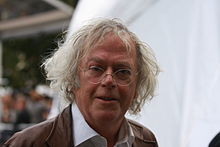- Dag Solstad
-
Dag Solstad (born 16 July 1941, Sandefjord, Norway) is a Norwegian novelist, short-story writer, and dramatist whose work has been translated into several languages.[1] He has written nearly 30 books and is the only author to have received the Norwegian Literary Critics’ Award three times. His works have been translated into 20 languages.
His awards include the Mads Wiel Nygaards Endowment in 1969, the Nordic Council's Literature Prize in 1989, for Roman 1987 and the Brage Prize in 2006 for Armand V. Solstad is among Norway's top-ranked authors of his generation. His early books were considered somewhat controversial, due to their political emphasis (leaning towards the Marxist-Leninist side of the spectrum). Dag Solstad lives in part time in Berlin and part time in Oslo.
In 16.07.41 (2002), he tells the story in the first-person narrative, of his long and frequent walks through the streets of Berlin. However, the story is at the same time a journey in pursuit of a father-son relationship.
T. Singer (1999) is a story about a 34 year old librarian leaves Oslo in search of a satisfying and anonymous life in a smaller town. He marries a single mother and at first feels contented in his invisible role as husband and stepfather. However, after two years, Singer files for divorce; she is later killed in a car accident. He returns to Oslo with his stepdaughter where they live together but lead separate lives. Singer broods and becomes very alone yet feels content in the fact that he has chosen an enigmatic lifestyle. This book contains philosophical and existential observations of someone seeking to authenticate their identity through chosen isolation rather than social integration.
Medaljens forside (1990) is a book on the history of the industrial construction and engineering company Aker Kværner, but the author insists it should nevertheless be considered as a novel, with the Aker company as its main character.
His 1982 novel Gymnaslærer Pedersens beretning om den store politiske vekkelse som har hjemsøkt vårt land was adapted for the screen in 2006 by Hans Petter Moland as Gymnaslærer Pedersen.
With fellow novelist Jon Michelet, Solstad has published a book after each of the FIFA World Cups in 1982, 1986, 1990, 1994 and 1998. The books blend analytic reporting with political and cultural commentary, and are contributions to genuine literature.
Solstad has also published various essays and articles, both for literary magazines and newspapers, and selections of these have been collected and published in three separate volumes.
In her Ph.D. thesis Why So Great? A Literary Discourse Analysis of Dag Solstad's Authorship (University of Oslo, 2009), Inger Østenstad argues from different perspectives that Solstad is Norway's greatest contemporary writer, and uses a version of Dominique Maingueneau's discourse theory to analyse the components of oeuvre, reception, para-text and meta-text that in Solstad's case contribute to his established greatness.
Contents
References
- ^ "Solstad Dag" (in Norwegian). Aftenposten. http://www.aftenposten.no/alex/litterat/forfatte/solstadd.htm. Retrieved 9 April 2010.
Novels
- Irr! Grønt! - (1969)
- Arild Asnes, 1970 - (1971)
- 25. septemberplassen - (1974)
- Svik. Førkrigsår - (1977)
- Krig. 1940 - (1978)
- Brød og våpen - (1980)
- Gymnaslærer Pedersens beretning om den store politiske vekkelse som har hjemsøkt vårt land - (1982)
- Forsøk på å beskrive det ugjennomtrengelige - (1984)
- Roman 1987 - (1987)
- Medaljens forside - (1990)
- Ellevte roman, bok atten - (1992)
- Genanse og verdighet - (1994)
- Professor Andersens natt - (1996)
- T. Singer - (1999)
- 16/07/41 - (2002)
- Armand V. Fotnoter til en uutgravd roman - (2006)
- 17. roman − (2009)
Awards and prizes
- Mads Wiel Nygaard's Endowment 1969
- Norwegian Critics Prize for Literature 1969, for Irr! Grønt!
- Språklig samlings litteraturpris 1982
- Nordic Council's Literature Prize 1989, for Roman 1987
- Norwegian Critics Prize for Literature 1992, for Novel 11, Book 18
- Dobloug Prize 1996
- Gyldendalprisen 1996
- Brage Prize Honorary Award 1998
- Norwegian Critics Prize for Literature 1999, for T. Singer
- Vestfolds Litteraturpris 2001
- Aschehoug Prize 2004
- Brage Prize 2006, for Armand V. Fotnoter til en uutgravd roman
External links
- Dag Solstad's biography and bibliography at Aschehoug Agency
- Dag Solstad at Forlaget Oktober
- Solstad bibliography : literature by and on Dag Solstad (National Library of Norway)
Reviews
- Novel 11, book18 – Paul Binding in The Independent, December 12, 2008
- Shyness and Dignity – Boyd Tonkin in The Independent, November 28, 2006
Categories:- Norwegian writers
- Norwegian essayists
- Norwegian Critics Prize for Literature winners
- 1941 births
- Living people
- Dobloug Prize winners
- Norwegian novelists
- Norwegian dramatists and playwrights
- Norwegian short story writers
Wikimedia Foundation. 2010.


